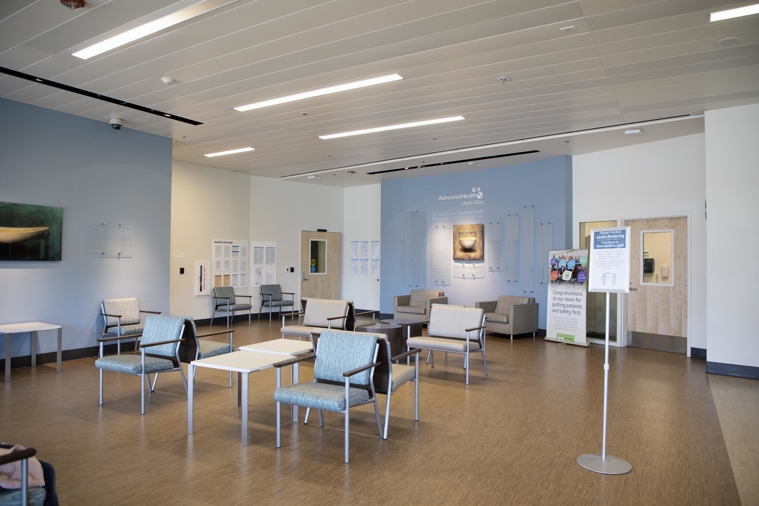
Adventist Health Ukiah Valley reminds community: Don't avoid the ER for medical emergencies
As concerns around COVID-19 continues and with shelter in place orders, Adventist Health Ukiah Valley’s emergency room staff are worried that non-coronavirus patients are avoiding getting much-needed medical care out of fear, especially when it comes to life-saving treatments for conditions such as stroke, heart attack or surgical emergencies. Hospital staff wants to remind the community to come in if they have a medical emergency.
“We are worried, based on the patients we are now seeing, that people have delayed seeking medical care despite having emergent and urgent conditions” shares Dr. Suzanne Hiramatsu, MD, emergency physician at Adventist Health Ukiah Valley.
She said people should not wait or hesitate to come to the hospital for an emergency. “We are capable of providing a safe environment for evaluation of all patients and do not want patients to delay life-saving or life-changing care due to fear of contracting COVID-19,” said Dr. Hiramatsu.
For some health emergencies, waiting too long to get help can cause complications and can be catastrophic, explains Dr. Hiramatsu. “For example, waiting too long for evaluation in cases such as stroke, chest pain, etc., can result in severe, even life-threatening consequences. Most of the time, when patients arrive in a timely manner we can identify and treat these conditions successfully however, waiting too long, could prevent proper care such as in the case for stroke or heart attacks.
It’s a concern many other hospitals are seeing across the nation. With shelter in place orders and the overall effort to not overwhelm the healthcare system, hospitals are seeing huge drops in patients scared to come in or heeding the call to stay home and thinking they are doing their part to help the hospitals by staying away.
“I think the concern for us, is if people are avoiding seeking care in the emergency department out of fear of COVID-19, or by trying to protect those working in emergency departments, they could be putting themselves at a higher risk ,” explains Becca Denoeu, RN, Director for the hospital’s emergency department.
She said the hospital has seen a significant decline in emergency room visits, dropping more than 50 percent compared to what they normally see. “It’s understandable. They are being considerate, and they don’t want to burden the hospital if they don’t have to. We are grateful to them for thinking of us, but we also want to reassure people that we’re here for them if they need us,”
Others are just afraid of coming in thinking they can get the virus by going to the hospital. But Denoeu explains that the hospital has taken steps to keep everyone safe, including not allowing visitors, screening all staff and patients coming in through the door and doing more cleaning and disinfecting to prevent the spread of the virus. All patients and staff are also given masks to help prevent anyone with a COVID-19 infection but no symptoms from spreading the virus.
All hospital staff wear protective equipment, especially those working with suspected coronavirus patients, who are fully gowned and masked, Denoeu said. The hospital staff is cleaning and disinfecting thoroughly, including a routine cleaning of all surfaces every few hours, and cleaning and disinfecting chairs between patients. All rooms are cleaned thoroughly and carefully between patients to prevent the spread.
Both Dr. Hiramatsu and Denoeu emphasized that anyone experiencing emergency symptoms should call 911 or come into the emergency department. The risk of catching COVID-19 is lower than the risk of ignoring serious symptoms, they said.
“We need them to come in if they are sick, especially when experiencing symptoms such as chest pain, difficulty breathing, slurred speech, facial drooping or confusion, or even abdominal pain that is not going way or relieved by taking over the counter pain medications,” Dr. Hiramatsu adds.
If their symptoms are mild and they feel stable, Dr. Hiramatsu explains they can always call their primary care physician to get guidance. Adventist Health Ukiah Valley’s primary and specialty clinics now offer virtual visits to provide care to patients in their homes. “However, anyone with symptoms of a heart attack or stroke, we want them here as soon as possible. If something doesn’t feel right, it’s best to reach out, whether that’s going to the emergency room or by giving your doctor a call,” she shares.
“We’re not overwhelmed,” Denoeu said. “Please don’t stay home in pain wondering if you should come. You should not put off getting medical care just because there’s a pandemic. We’re here for you. We want to care for our community, and we can provide that care in a safe manner during this current state.”


